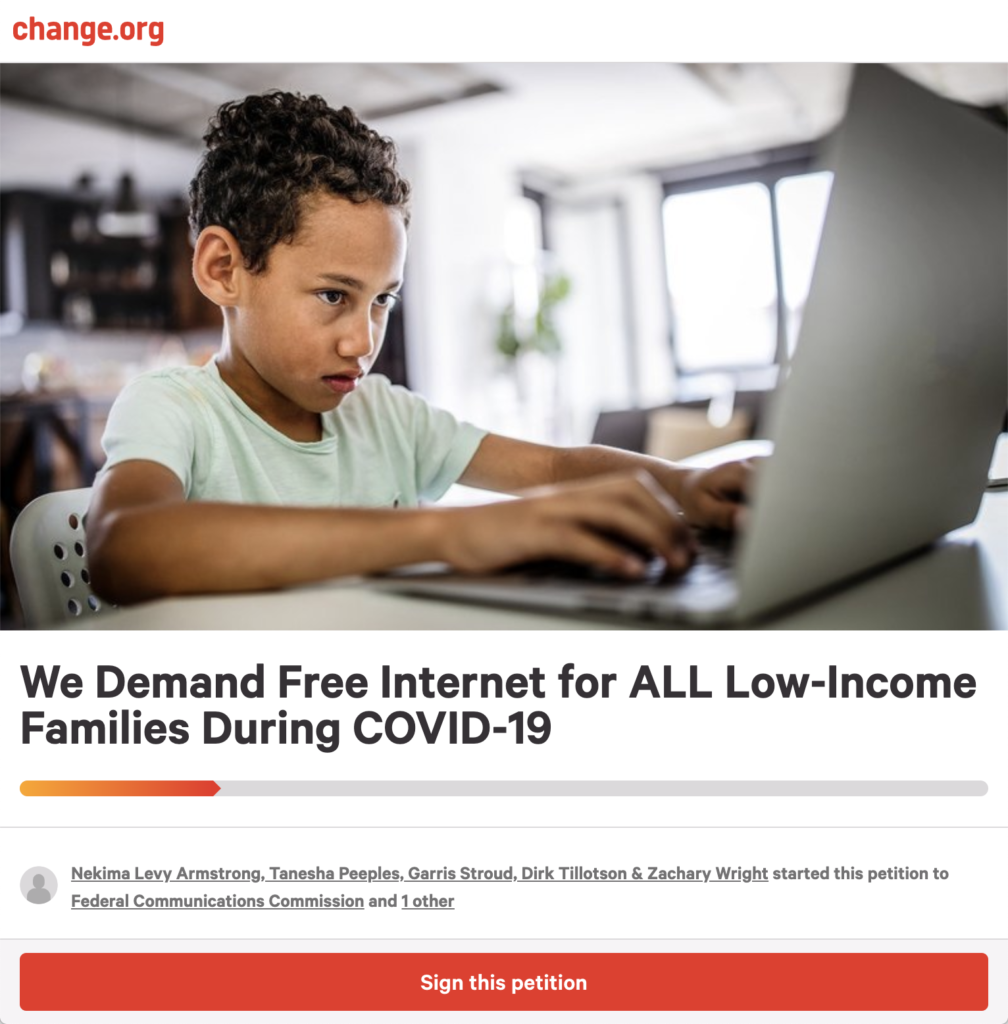
Apr 28, 2020 12:00:00 AM
They almost had me.
After weeks and weeks of working and fighting for the FCC to guarantee the educational rights of low-income families by compelling internet providers to ensure all students have access to remote learning, the FCC finally released a statement.
Adorned with all the formality of a press release from the federal government, the memorandum from April 27 announces “efforts to promote the use of $16 billion in funding from the recently enacted CARES Act’s Education Stabilization Fund for remote learning.” These monies would take the form the block grants accessible via an application that demands details on how the dollars would be used “especially for students with disabilities and students from low-income families.”
I read the memo and my heart started to race.
16 billion dollars!?
Billions for students with disabilities and students from low-income families!?
After all of these weeks of gathering nearly 15,000 signatures for a petition to galvanize the FCC to move on behalf of these students, after nearly dozens of articles and op-eds from educational activists across the country including former Secretary of Education Arne Duncan, finally there was hope that all students would be able to access the remote learning that is their right.
I’m an idealist at heart, and it was this idealism that blinded me to the truth behind this memo.
It’s a paper tiger; a red herring; a house of cards; a sleight of hand.
[pullquote position="right"]It does absolutely nothing to help kids.[/pullquote]
How? Let’s take a look.
First, there are absolutely zero new dollars apportioned for remote learning or internet access. The billions of dollars so proudly extolled are the dollars already spoken for in the Coronavirus Aid, Relief, and Economic Security (CARES) Act, which is by now fully a month old.
While the FCC would have us believe that districts across the country are now flush with cash with which to plug the holes of internet access, those 16 billion dollars, already decried as woefully inadequate, are designed to hold up and support the entirety of America’s educational infrastructure.
So much for bridging the digital divide.
Furthermore, the press release has no teeth and amounts merely to a paper slip dropped into a suggestion box. The FCC will “promote” the use of already appropriated dollars to bridge the digital divide. Moreover, [pullquote]what they are really “promoting” is that someone else—anyone—deal with the staggering inequality of access to broadband internet.[/pullquote] Maybe “promotion” would mean something if Chairman Ajit Pai was using his bully pulpit to actually influence the companies who currently control access to the internet, which by the way is totally his job. To “promote” that other people solve this problem without the FCC is the same as doing nothing, except that such “promoters” can claim they tried their best when in fact they did nothing.
So, why issue a formal press release that uses a whole lot of words to say a whole lot of nothing?
Because they are attempting to pass the buck, to shift the focus of educational activists, students, parents, and families from all across the country away from the FCC and onto the states, and Congress, and Betsy DeVos and the Department of Education. Onto basically anyone else.
Let’s be clear.
As the nation’s “primary authority for communications law,” internet access is firmly within the FCC’s jurisdiction. And right now, as 12 million students in America are tacitly segregated away from their digital classrooms, instead of fighting for these students, [pullquote]the FCC is shirking responsibility for “keeping Americans connected” so it can stay friendly to the business interests of enormous telecommunications.[/pullquote]
If you are reading this and you have a loved one who is currently using the internet to access their education, you have a responsibility to fight for the millions of students who are not afforded the same privilege.
If the child you loved couldn’t go to school, you would not stand idly by.
So join us, and demand that the FCC do what’s right and just.
Demand internet access for low-income and marginalized American families now.

Zachary Wright is an assistant professor of practice at Relay Graduate School of Education, serving Philadelphia and Camden, and a communications activist at Education Post. Prior, he was the twelfth-grade world literature and Advanced Placement literature teacher at Mastery Charter School's Shoemaker Campus, where he taught students for eight years—including the school's first eight graduating classes. Wright was a national finalist for the 2018 U.S. Department of Education's School Ambassador Fellowship, and he was named Philadelphia's Outstanding Teacher of the Year in 2013. During his more than 10 years in Philadelphia classrooms, Wright created a relationship between Philadelphia's Mastery Schools and the University of Vermont that led to the granting of near-full-ride college scholarships for underrepresented students. And he participated in the fight for equitable education funding by testifying before Philadelphia's Board of Education and in the Pennsylvania State Capitol rotunda. Wright has been recruited by Facebook and Edutopia to speak on digital education. In the wake of the COVID-19 pandemic, he organized demonstrations to close the digital divide. His writing has been published by The Philadelphia Inquirer, The Philadelphia Citizen, Chalkbeat, Education Leadership, and numerous education blogs. Wright lives in Collingswood, New Jersey, with his wife and two sons. Read more about Wright's work and pick up a copy of his new book, " Dismantling A Broken System; Actions to Close the Equity, Justice, and Opportunity Gaps in American Education"—now available for pre-order!
The story you tell yourself about your own math ability tends to become true. This isn’t some Oprah aphorism about attracting what you want from the universe. Well, I guess it kind of is, but...
If you have a child with disabilities, you’re not alone: According to the latest data, over 7 million American schoolchildren — 14% of all students ages 3-21 — are classified as eligible for special...
The fight for educational equity has never been just about schools. The real North Star for this work is providing opportunities for each child to thrive into adulthood. This means that our advocacy...
Your donations support the voices who challenge decision makers to provide the learning opportunities all children need to thrive.
Ed Post is the flagship website platform of brightbeam, a 501(c3) network of education activists and influencers demanding a better education and a brighter future for every child.
© 2020–2024 brightbeam. All rights reserved.
Leave a Comment